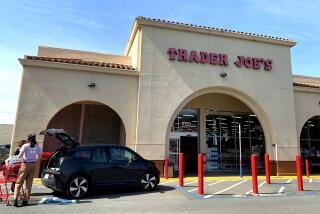FDA says GMO apples, potatoes are ‘safe for consumption’
The Food and Drug Administration on Friday gave its blessing to two new varieties of genetically engineered apples and six varieties of potatoes also created by genetic alteration. The agency called the new strains of apples and potatoes “as safe and nutritious as their conventional counterparts,” a finding that makes their appearance on the U.S. market imminent.
With the agency’s statement, the Canadian firm Okanagan Specialty Fruits Inc., is expected to sell in the United States a Granny Smith and Golden Delicious apple that resists browning after being bruised or cut open. The new strains of fruit are to be known collectively by the trade name Arctic Apples.
In addition, the J.R. Simplot Co. of Idaho will likely market its new varieties of Ranger Russet, Russet Burbank and Atlantic potatoes to be sold under the trade name Innate.
The Innate potatoes have been genetically engineered to reduce the formation of black spot bruises and to produce less acrylamide when they are fried. A suspected carcinogen, acrylamide can form in some foods when they are cooked at high temperatures.
To create Granny Smith and Golden Delicious apples that resist browning when their skin is broken, Okanagan scientists altered the strains’ genomes in ways that lowered their production of key enzymes involved in the browning process.
Food scientists maintain the genetic changes will make their produce healthier, more palatable and easier to transport and sell without spoilage. The companies say this will also result in less food waste.
But the FDA decision is certain to spark controversy among critics who argue that genetically modified foods will introduce potentially dangerous unknowns into the American food supply.
The FDA said Friday that foods derived from genetically engineered plants must meet the same legal standards, including safety standards, as foods derived from traditional plant breeding methods. The agency has noted that “people have been modifying plants for thousands of years through breeding and selection.”
Although producers of genetically engineered foods are not compelled to submit their products for FDA approval, the agency has encouraged companies with such food products to participate in a voluntary consultation process with the agency before commercial distribution.
That prompted Okanagan, of British Columbia, Canada, and Simplot, of Boise, Idaho, to give the FDA a summary of their safety and nutritional assessments.
“The consultation process includes a review of information provided by a company about the nature of the molecular changes and the nutritional composition of the food compared to traditionally bred varieties,” said Dennis Keefe, who directs the FDA’s Office of Food Additive Safety. “This case-by-case safety evaluation ensures that food-safety issues are resolved prior to commercial distribution.”
It’s not clear whether Okanagan or Simplot will tag their new products with the label “genetically engineered organisms,” or GMOs. Many consumer groups have advocated compulsory labeling of genetically engineered foods.
The agency is reviewing two citizens petitions calling on the FDA to require such labeling but has not issued a decision.
Follow me on Twitter @LATMelissaHealy and “like” Los Angeles Times Science & Health on Facebook.







